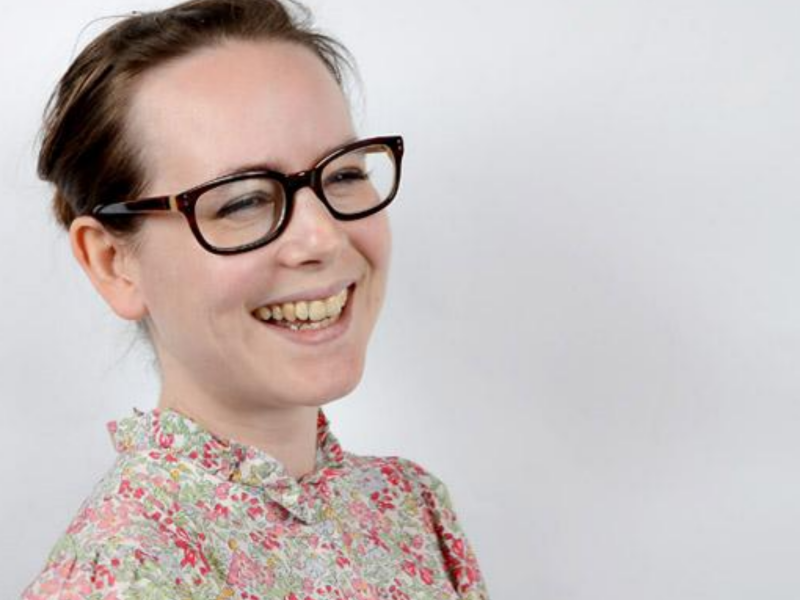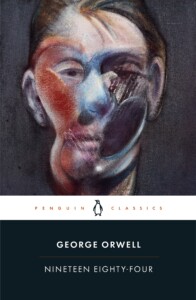Sex, Sexuality and the Alt-right in Nineteen Eighty-Four, by Sian Norris

Share this
In George Orwell’s dystopia republic of Oceania, the Party of Big Brother is determined to ‘kill off the sex instinct’. If it can’t be killed, they aim to ‘distort it, or dirty it’, reducing sex to a function, a couple’s ‘duty to the Party’.
So when Winston Smith and Julia embark on a sexual affair that takes up the central section of Orwell’s final novel Nineteen Eighty-Four, they are, according to George Woodcock (the essayist and literary critic who was Orwell’s friend), setting out on an ‘insurrection through passion, through the undisciplined sexual activity which the ruling party regards as a dangerously subversive activity’. The pair will ignite ‘the force that would tear the Party to pieces’. This revolutionary mission is, Woodcock notes, ‘doomed to failure’.
The exploration and representation of sex and sexuality in Nineteen Eighty-Four is interesting in its own right, and in what it tells us about totalitarian attitudes towards sex and women’s bodies. For a modern reader, it contains important lessons of how authoritarian regimes view sex and sexuality, as an insurgent Far Right attacks women’s sexual freedom.
Struggling to survive under Big Brother’s regime, in a grey and dreary London where he is constantly damp, cold and tired, Winston Smith is always, according to Woodcock, ‘seeking to get back to an ancient and more natural way of life where such things as historical truth, golden landscapes, sexual love and human idiosyncrasies are once again allowed’.
Julia and her ‘youthful body’ become the embodiment of everything he has been looking for. She represents truth, nature, sex and quirk — through her body he can live out his desire to rebel against the Party. If the Party slogan is ‘freedom is slavery’, then in Julia and Winston’s rebellion, freedom is sex.
The one genuine act in Nineteen Eighty-Four is the moment when Julia passes Winston a note that simply says ‘I love you’. While Winston struggles to articulate his horror of the Party and the world around him in his journal, holding his pen with terrified uncertainty over its cream pages, Julia is fearless and determined in her commitment to her own desire and emotion. She marks the paper, she expresses her desire, she takes control.
Orwell associates Julia with nature — a common trope that positions women’s sexuality as being analogous to the natural world, wildness, and instinct. On their first sexual encounter, Julia takes Winston to the woods, a place he recognises as the ‘golden place’ of his dreams and fantasies. The copse where they first make love is drawn in contrast to the grey, dreary mechanical city that London has become under the Party. The ‘rabbit bitten’ landscape is the opposite of Party’s urban centre, and Julia’s sexual, enjoying body is the antidote to the barren, sexless, mechanical Party body. She ‘pulled a bluebell out of her hair’; she has the ‘animal instinct’.
If Winston and the city represents rationality and the intellect, then Julia and the copse represent emotion and the body. By placing their sexual encounter in an idyllic, even bucolic country scene, Orwell positions sex as something pure and innocent, contrasted to the Party’s view of sexuality as ‘dirty’ — O’Brien later talks about Julia’s ‘dirty mindedness’. Later on, when their affair takes place in the room above the antiques shop, we again see Julia and her body as standing in for Winston’s bigger yearnings: a return to history, a past formed by human relationships and interactions. Julia’s enjoyment of sex for pleasure’s sake is seen by Winston as something as beautiful and useless as the green glass sphere with its coral inside.
It’s a credit to Orwell’s writing that Julia is elevated from a symbol to a human being. The clue to this may be in his relationship to his second wife, Sonia, whose ‘boldness and directness’ had ‘captivated’ Orwell, according to her biographer Hilary Spurling. Sonia’s ‘youth and prettiness, her toughness, above all her radiant vitality, fed directly into’ Julia.
By giving Julia the agency to hand Winston her note, Orwell prevents her from appearing as a mere sex object, or, at least, a fulfilment of a fantasy. Through the note, her love, her honesty and her sexuality, Julia escapes her fate as a plot device existing solely for Winston’s development and downfall.
We know very little about Julia’s background and what led her to reach out to Winston and express her love. One answer could lie in her job at Pornosec, which produces ‘the lowest kind of pornography’ —but what does that look like in a society determined to destroy the sex instinct?
Is it how we understand pornography today — the mechanical repetition of sexual acts with little pleasure or mutual desire involved? Or, could it be something different? Under a Party that wants to ‘persuade you that mere impulses, mere feelings were of no account’, wouldn’t truly subversive pornography feature expressions of genuine desire, passion, and pleasure?
In a world where sex and love and desire are reduced to filth, perhaps the real ‘filth’ coming out of the fiction department where Julia works are expressions of exactly what the Party despises.
Orwell wrote Nineteen Eight-Four in the years following the defeat of the Nazi regime which adopted policies to exploit women’s reproduction in order to build up the Aryan population and race. His description of a society where women’s bodies are subservient to their ‘duty to the Party’ — Winston’s wife Katherine submits to sex once a week not because she enjoys it, but because the Party forces her to experience her own body as a machine for reproductive labour — offers a salutary example of how totalitarian regimes view women’s bodies.
Throughout the 1930s the Nazis weaponised women’s bodies through a medal system that rewarded women for having three or more children. Likewise, sex to the Party is a function to ‘beget children’.
The exploitation of women’s reproduction and sexuality has been a key tactic for states seeking to strengthen their power for centuries. The switch to criminalising abortion in 1860s USA was, in part, a reaction to the ‘threat’ to the Anglo Saxon white population posed by growing immigration. More than 100 years later, American alt-right voices pair their attacks on women’s rights with conspiracy theories about ‘white genocide’ and the ‘great replacement’ — the idea that white men will be ‘replaced’ by the black and minority ethnic population. Meanwhile, in Europe, right-wing leaders in Hungary and Greece offer women incentives to have more children in order to combat the perceived threat of immigration from the global south.
Just as the Party viewed Julia’s sexuality as a threat to their power in Nineteen Eighty-Four, so does an insurgent, authoritarian Far Right attack women’s sexuality and bodily autonomy today.
Men’s Rights Activists and the alt-right plan to enslave women’s bodies to male control and entitlement — incel forums, for example, fantasise about creating a class of sex slaves in the model of terrorist group IS. In their world-view, women do not exist as autonomous human beings but as bodies to penetrate, sexually use, and impregnate. In Nineteen Eighty-Four, the Party places sex in the same sphere, and women’s bodies are tools to produce the next generation of Party acolytes.
Julia’s free and expressive sexuality therefore threatens the Party’s power — her enjoyment of non-procreative sex is ‘outside the Party’s control’. Her pleasure in, and understanding of, her own desires gives her an insight that Winston lacks. She knows the Party wants to eliminate the sex instinct because sexual feelings could be ‘transformed into war-fever and leader worship’, while a happy, satisfied body isn’t going to give two hoots about loving Big Brother.
Whether it’s a Red Pill forum member, a policy-maker in Fidesz, or Orwell’s Party, authoritarian regimes position women’s bodies as machines for men and the state to exploit. In doing so, they successfully dehumanise women. That process of dehumanisation destroys the ‘loyalty between men and women’ and makes humans easier to control.
Julia smashes all that up.
Despite Winston associating her with nature and history and truth, Julia resolutely refuses to be an object. She is the subject — she has the agency, and she enjoys sex and her own sexuality for their own sake. She doesn’t care about the Brotherhood, the Party, or the intellectual arguments that Winston engages in – she doesn’t treat sex as a political victory but as a pleasure to enjoy and indulge in. She cares about her own, personal rebellion.
That is why she is so dangerous. Julia will never love Big Brother as Winston does. She might betray her lover, but she remains a force the Party can never control.
